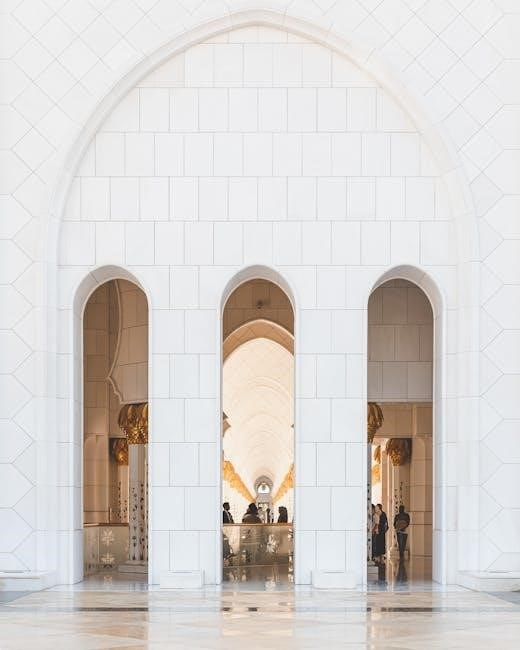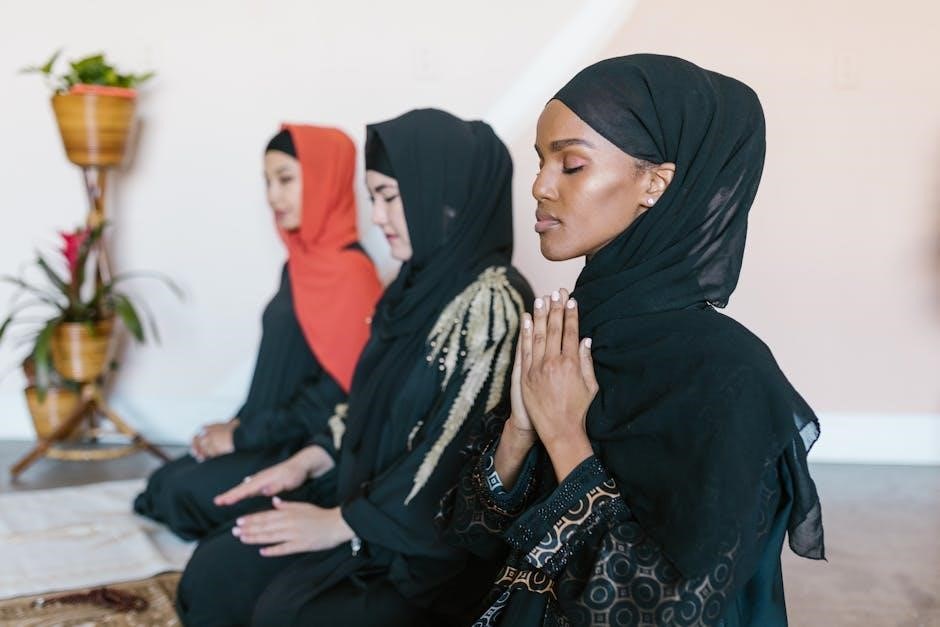Islamic manners‚ as outlined in Abu Ghuddah’s work‚ serve as a comprehensive guide to ethical behavior‚ emphasizing humility‚ respect‚ and righteousness in daily interactions and worship.
Overview of the Book “Islamic Manners” by Abu Ghuddah
The book Islamic Manners by Shaykh Abdul Fattah Abu Ghuddah is a concise yet profound guide to understanding and implementing Islamic etiquette in everyday life. Written by one of the most respected scholars of the 20th century‚ the book emphasizes the importance of adhering to the teachings of Islam in all aspects of behavior and interaction. It covers essential topics such as greetings‚ eating‚ dressing‚ and worship‚ providing practical examples and references from Islamic texts. The author highlights often-overlooked manners and encourages believers to embody the sublime Islamic personality; Available in multiple formats‚ including PDF‚ EPUB‚ and Kindle‚ this 120-page book is a valuable resource for Muslims seeking to refine their character and spiritual growth. Its clear and accessible style makes it suitable for readers of all levels.

Importance of Islamic Etiquette in Daily Life
Islamic etiquette plays a vital role in shaping a Muslim’s character and fostering a harmonious society. By adhering to these guidelines‚ believers reflect the teachings of Islam in their interactions‚ enhancing respect and compassion. Proper manners in daily activities‚ such as eating‚ dressing‚ and greeting‚ promote a dignified and humble lifestyle. They also serve as a means of worship‚ as every action performed with mindfulness of Allah is considered an act of devotion. Cultivating these etiquettes helps individuals maintain a clean appearance‚ foster positive relationships‚ and uphold the values of their faith. Ultimately‚ Islamic etiquette is not just a set of rules but a way to embody the divine attributes of kindness‚ gratitude‚ and modesty in all aspects of life.

Key Principles of Islamic Manners
Islamic manners revolve around respect‚ humility‚ and maintaining a clean appearance. These principles‚ rooted in faith‚ guide interactions with others and worship‚ fostering a balanced‚ morally upright life.
The Concept of Adab in Islam
Adab in Islam encompasses the ethical and moral conduct expected of Muslims‚ reflecting a deep respect for faith and community. It emphasizes maintaining dignity‚ humility‚ and righteousness in all actions‚ from worship to social interactions. Abu Ghuddah’s work highlights adab as a vital part of Islamic character‚ fostering a balanced and harmonious life. By adhering to these principles‚ believers can uphold the teachings of the Prophet Muhammad (peace be upon him) and live a life pleasing to Allah. This concept is central to building a morally upright society‚ where individuals honor their faith and each other through their conduct and demeanor.

Respect for Elders and Younger Ones
In Islam‚ respecting elders and younger ones is a fundamental aspect of social etiquette. Elders are to be treated with honor and dignity‚ as their wisdom and experience are valued. Younger individuals should show deference through polite speech and actions‚ while older individuals are encouraged to guide and nurture the youth with compassion. Abu Ghuddah emphasizes that this mutual respect fosters a harmonious family and community structure‚ reflecting the teachings of the Prophet Muhammad (peace be upon him). By upholding these values‚ Muslims contribute to a society built on love‚ understanding‚ and mutual support‚ ensuring the preservation of Islamic moral standards across generations.
Etiquettes of Speech and Silence
In Islam‚ the etiquettes of speech and silence are crucial for maintaining a dignified and compassionate demeanor. Abu Ghuddah highlights the importance of speaking truthfully‚ kindly‚ and with purpose‚ avoiding idle talk or gossip. Muslims are encouraged to use their words to uplift others‚ promote peace‚ and avoid harm. Silence is equally valued‚ particularly in situations where speaking might lead to discord or unnecessary conflict. The Prophet Muhammad (peace be upon him) often remained silent to reflect or avoid engaging in futile discussions. By adhering to these principles‚ believers cultivate self-control‚ earn respect‚ and foster harmonious relationships. Abu Ghuddah emphasizes that mindful speech and thoughtful silence are essential for embodying the Islamic values of wisdom‚ mercy‚ and integrity in daily life.
Daily Life Etiquettes
Daily life etiquettes in Islam‚ as taught by Abu Ghuddah‚ encompass proper manners in eating‚ dressing‚ prayer‚ and hygiene‚ emphasizing gratitude‚ humility‚ and moderation in all actions.

Manners of Eating and Drinking
Islamic manners of eating and drinking‚ as highlighted by Abu Ghuddah‚ emphasize gratitude‚ moderation‚ and mindfulness. One should begin meals with Bismillah (In the name of Allah) and eat with the right hand‚ as taught by the Prophet Muhammad (peace be upon him). Moderation is key; one should neither overindulge nor waste food. Chewing slowly and avoiding speaking with the mouth full are also advised. After finishing‚ saying Alhamdulillah (Praise be to Allah) is recommended to express gratitude. These etiquettes reflect the balance between physical nourishment and spiritual growth‚ fostering humility and contentment in everyday life.
Etiquettes of Dressing and Grooming
Islamic etiquette places significant emphasis on modesty and cleanliness in dressing and grooming. Abu Ghuddah highlights the importance of wearing clean‚ modest clothing that adheres to Islamic guidelines. Men are encouraged to dress in a way that reflects humility‚ avoiding excessive ornamentation or tight-fitting clothes. Women are advised to cover their bodies appropriately‚ ensuring dignity and modesty. Personal grooming‚ such as trimming nails‚ maintaining a clean beard‚ and perfuming oneself moderately‚ is also stressed. These practices not only uphold spiritual purity but also promote a respectful and orderly appearance in society. Abu Ghuddah reminds believers that their outward demeanor should reflect their inner faith‚ fostering a harmonious balance between physical presentation and spiritual devotion.
Prayer and Worship Manners
Islamic prayer and worship manners‚ as detailed by Abu Ghuddah‚ emphasize the importance of proper conduct during acts of devotion. Believers are encouraged to prepare for prayer by ensuring cleanliness of the body and clothing. Facing the Ka’bah and maintaining focus during prayers are stressed to uphold the sanctity of worship. The book highlights the need to avoid distractions‚ such as excessive movement or improper attire‚ to maintain humility and concentration. After prayer‚ expressing gratitude and performing post-prayer supplications are recommended. Abu Ghuddah also emphasizes adhering to the Sunnah‚ such as the proper way to enter and exit the mosque‚ and the etiquette of congregational prayers. These guidelines ensure that worship is performed with the utmost respect and sincerity‚ reflecting a deep connection to Allah and the Islamic faith.

Social Interactions
Social interactions in Islam‚ as Abu Ghuddah explains‚ are rooted in respect‚ justice‚ and compassion. Muslims are encouraged to greet others kindly‚ avoid harm‚ and foster harmonious communities.
Etiquettes of Greeting and Meeting People
Etiquettes of greeting and meeting people are essential in Islam. Abu Ghuddah highlights the importance of using the Islamic greeting‚ As-Salamu Alaikum‚ which translates to “Peace be upon you.” This greeting fosters peace and unity among believers. When meeting someone‚ it is recommended to smile‚ make eye contact‚ and extend a warm handshake. The Prophet Muhammad (peace be upon him) emphasized that spreading peace is a fundamental aspect of faith. Abu Ghuddah also notes that avoiding unnecessary physical contact with the opposite gender is a sign of modesty and respect. Proper etiquette in greetings reflects one’s character and adherence to Islamic values.

Manners of Visiting the Sick and Attending Gatherings

Visiting the sick is a virtuous act in Islam‚ as it reflects compassion and care. Abu Ghuddah emphasizes that such visits should be done with the intention of earning Allah’s reward and uplifting the spirits of the ailing. One should enter with permission‚ greet the sick with calm words‚ and avoid lengthy stays to prevent fatigue. It is recommended to supplicate for their recovery‚ using phrases like “Allahumma Ajezhu” (O Allah‚ grant him health). When attending gatherings‚ Muslims are encouraged to do so with the intention of benefiting spiritually‚ engaging in positive conversations‚ and avoiding unnecessary disputes. Dress modestly‚ maintain good hygiene‚ and demonstrate respect for all attendees‚ ensuring that interactions align with Islamic values and promote unity;
Respect for Privacy and Personal Boundaries
Respecting others’ privacy and personal boundaries is a cornerstone of Islamic manners. Abu Ghuddah highlights the importance of avoiding intrusion into others’ private affairs‚ as this reflects a person’s dignity and moral character. The Quran emphasizes‚ “O believers‚ do not enter houses other than your own until you have asked permission and greeted those within” (Quran 24:27-28). This principle extends to safeguarding secrets and refraining from unnecessary questioning. Respect for personal space ensures harmonious relationships and maintains trust within the community. Abu Ghuddah underscores that upholding these etiquettes fosters a society built on mutual respect and dignity‚ aligning with the teachings of the Prophet Muhammad (peace be upon him)‚ who exemplified humility and kindness in all interactions.
Islamic manners‚ as taught by Abu Ghuddah‚ form the essence of a Muslim’s character‚ fostering a balanced and ethical lifestyle that reflects divine wisdom and societal harmony.
Final Thoughts on Implementing Islamic Manners
Islamic manners‚ as highlighted by Abu Ghuddah‚ are not just a set of rules but a way of life that reflects a Muslim’s commitment to faith and community. By embracing these etiquettes‚ individuals cultivate humility‚ respect‚ and compassion‚ fostering a balanced and ethical lifestyle. Abu Ghuddah’s work reminds believers of the often-overlooked aspects of Islamic behavior‚ emphasizing their relevance in modern society. These manners‚ rooted in the teachings of the Prophet Muhammad (peace be upon him)‚ serve as a guide for personal and communal harmony. Implementing them consistently requires self-awareness and dedication‚ but the rewards are immense‚ leading to a life of tranquility and divine pleasure. Ultimately‚ Islamic manners are a powerful tool for transforming individual lives and creating a more just and harmonious world.
Benefits of Adhering to Islamic Etiquette
Adhering to Islamic etiquette fosters a life of spiritual growth‚ social harmony‚ and divine pleasure. By following these guidelines‚ individuals cultivate humility‚ compassion‚ and justice‚ reflecting the sublime Islamic personality. Such manners strengthen relationships‚ promote respect‚ and create a sense of community. They also guard against harmful behaviors‚ ensuring personal and societal well-being. Abu Ghuddah emphasizes that these etiquettes are not merely rituals but a holistic way of life‚ transforming interactions with Allah‚ others‚ and oneself. By embracing Islamic manners‚ believers attain inner peace‚ earn divine reward‚ and contribute to a more just and harmonious world. Ultimately‚ these practices embody Islam’s timeless wisdom‚ guiding individuals toward a balanced and righteous existence.